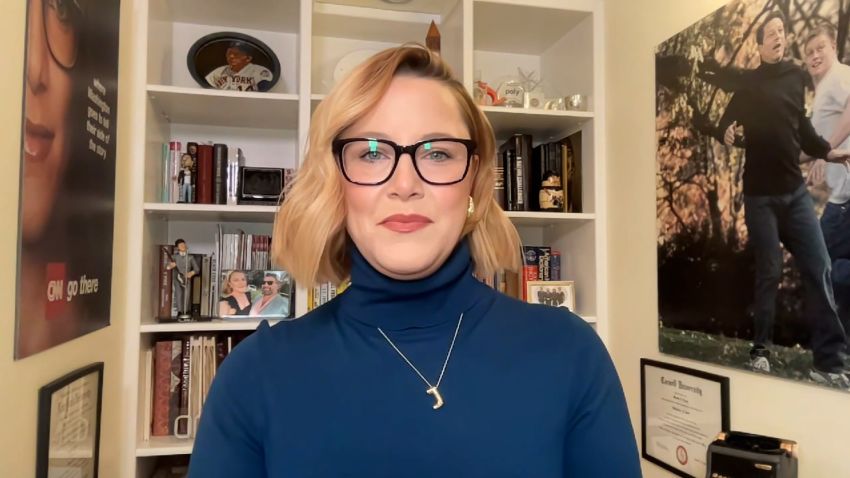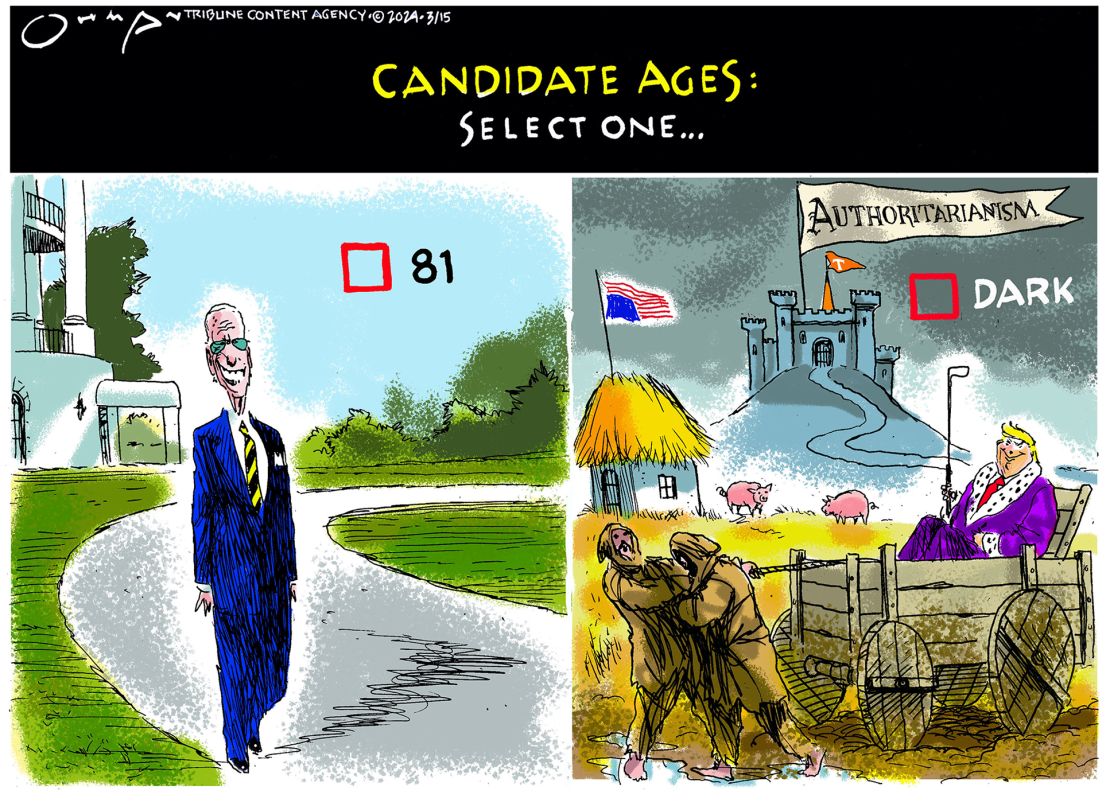Editor’s Note: Sign up to get this weekly column as a newsletter. We’re looking back at the strongest, smartest opinion takes of the week from CNN and other outlets.
CNN
—
In the Oscar-winning movie “Poor Things,” Ramy Youssef plays a student who hungers for the merest sign of approval from his professor. His character, Max McCandles, feels a surge of hope when teacher and surgeon Dr. Godwin Baxter brings up the student’s recent paper.
“You liked it, sir?”
The doctor, a mashup of Dr. Frankenstein and his monster played hilariously by Willem Dafoe, fires back, “It showed signs of a conventional mind straining hard to almost touch mediocrity.”
McCandles mutters, “Thank you.” It is the first of many humiliations at the hands of Baxter, who’s fond of his nickname, “God.”
The two candidates who clinched their parties’ nomination for president last week are also straining for approval, and barely touching mediocre levels of it. Fifty-nine percent of Americans disapprove of President Joe Biden’s performance, according to CNN’s Poll of Polls, with recent surveys showing that the president got no bump from his energetic State of the Union address. Former President Donald Trump’s favorability ratings are only slightly better.
If the polls are correct, Biden may need everything to go right for him to beat Trump in November, but with less than eight months left to go, almost everything is going wrong. Gas prices are rising and progress in stamping out high inflation more generally seems to have stalled, possibly jeopardizing interest rate cuts that could fuel the economy.
A deal to free hostages in Gaza and pause the fighting between Israel and Hamas has so far failed to materialize, intensifying criticism of Biden’s backing of Israel among some voters on the left.
The bipartisan legislation to control the flow of migrants across the southern border was blown up by opposition from Trump. And the former president is winning delay after delay in the four criminal trials he faces.
One thing that is going right for Biden is Trump himself.
The former president’s incendiary rhetoric continued at an Ohio rally Saturday as he warned of a “bloodbath for the country” if he is defeated by Biden. The extreme tone is helping Biden build a fundraising advantage over Trump.
As Ruth Ben-Ghiat wrote, “Vladimir Putin, Recep Tayyip Erdogan, Viktor Orban, Adolf Hitler, Xi Jinping, Kim Jong-un, Saddam Hussein: What do they have in common? All of these authoritarians have reportedly drawn praise from former US president — and now GOP presidential nominee — Donald Trump, who has promised Americans that he, too, will be a dictator ‘on Day One’ of his time in office…”
“Wherever they fall on the political spectrum, autocrats are united in their disregard for human rights and human dignity and their attempt to persuade people that it is in their interests to support governments that take their rights away. This seems to be Trump’s project as well. The former president may be telling us that he will only be a dictator for one day, but no authoritarian has ever relinquished power once he gains it and the strongmen he exalts have all been in power for many years,” Ben-Ghiat wrote.
“I want to vote for Donald Trump in November, wrote Marc A. Thiessen in the Washington Post. “The question is: Will he let me? … After meeting with Trump at Mar-a-Lago on Friday, Hungarian Prime Minister Viktor Orban said that Trump assured him he ‘will not give a penny’ to help Ukraine defend itself from Russian aggression. If true, that’s not the Trump I want to vote for.”
“I can’t do that if I believe that Trump’s second term won’t be a continuation of the best elements of his first, but a radical departure focused on revenge and retreat from the world.”
Voters give Trump higher marks on handling the economy than they do Biden. One reason for that may be the reality that while the inflation rate is going down (from roughly 9% a year in 2022 to a little more than 3% now), prices remain at elevated levels. Dana M. Peterson and Erik Lundh of the Conference Board crunched the numbers to come up with these eyebrow-raising stats: “Used car prices are 34% higher, food prices are 26% higher and rent prices are 22% higher than in January 2020, according to our calculations using PCE data,” they wrote.
“While these are some of the more extreme examples of recent price increases, the average basket of goods and services that most Americans buy in any given month is 17% more expensive than four years ago. Prior to the pandemic, it took more than 10 years for general price levels to rise that much, according to Conference Board calculations.”
For more:

SE Cupp: Is Trump’s RNC shakeup bold? Or just dumb?
Arick Wierson: Will RFK Jr. lob a ‘hail Mary’ to Aaron Rodgers?
Julian Zelizer: The Kamala Harris factor in 2024
Andrey Spektor: What Hunter Biden and Donald Trump have in common
Andrea Hailey: We’re already seeing more creative efforts to make it harder to vote this year
Frederick D. Baron and Dennis Aftergut: Intelligence briefings for Trump are risky – but so is denial of briefings

The US Constitution requires candidates to be at least 35 years old to run for the presidency, but there’s no maximum age. With the two oldest candidates in American history running in 2024, many are asking if there should be a limit. In a new CNN Opinion feature, Matter of Debate, moderated by Hilary Krieger, two experts debated the issue.
Gary Schmidt, a former White House official and senior fellow with the American Enterprise Institute, argued, “The key point is that being an elected official, be it a member of Congress or the president, carries with it great responsibilities and, as such, we want those elected officials as healthy in mind and body as possible. And we know that generally, as we get older, our mental and physical capacities diminish.” The presidency is “a 24/7 job and has great stress. And, as someone who just turned 72, I can say that I and most of my friends my age would not be up to the job.”
Bradley Schurman, an expert on aging who’s 46, responded, “Removing someone’s ability to serve, simply because of an arbitrary measure like their birthdate is problematic.” People are free to factor in concerns about age when they vote. “Any office holder should be in good physical and mental health. … Just like office holders have released their tax returns (up until former President Donald Trump), I would like to see more candidates release their physical and mental health assessments,” Schurman observed.
An assessment of a sort came last month when Special Counsel Robert Hur reported that while he had decided not to charge Biden with any crimes related to his handling of classified documents, he called the president “an elderly man with a poor memory.”

As Patrick T. Brown noted, a House hearing Tuesday featuring Hur “coincided with the release of the transcript of Biden’s interview, highlighting a man who twice couldn’t recall the word for fax machine, needed help remembering what years he served as vice president, told rambling stories and had ‘no idea’ how his aides stored or handled sensitive documents.”
But coming after Biden’s forceful State of the Union, Brown added, Republicans “will need to find ways of pointing out Biden’s advanced years that underscore a deeper critique of his competency.”
The inflationary impact of Biden’s desire to “spend $2.2 trillion on social programs” and “his apparent willingness to ignore top military advisers during the tumultuous Afghanistan withdrawal, should be front and center of any campaign ad. The GOP can paint a picture of a president who sought to follow in the footsteps of Franklin D. Roosevelt but misread the moment, and who let events across the world overtake his ability to lead America.”
A Georgia judge ruled in favor of Fulton County District Attorney Fani Willis, allowing her to continue overseeing the prosecution of Donald Trump and others over the 2020 election, as long as Willis’ former romantic partner, Nathan Wade resigned as a special prosecutor on her staff. Wade did so soon after the ruling on Friday.
Norman Eisen, E. Danya Perry and Joshua Kolb praised Judge Scott McAfee for a “Solomonic decision” in the case. “Now that this sideshow has begun to pass with Wade’s resignation, the most important next step is for the trial to be scheduled quickly. The case needn’t be delayed by Wade leaving the team — the very able group of assistant district attorneys and the other prosecutors who have long handled this case can continue their work.”
“The Fulton County prosecution is critical to adjudicate the charges pertaining to the 2020 election — allegations that strike at the heart of our democracy and abuse of power. Therefore, the trial must begin as soon as possible so voters know Trump’s role before they once again cast votes in a presidential election in which he’s on the ballot.”
Biden took some heat from progressives for calling an undocumented alien accused of murder in Georgia an “illegal.” Jose Antonio Vargas, who declared in 2011 that he was undocumented, wrote, “It’s not a big thing that a sitting US president referred to a group of people as ‘illegal.’ Obsessing over this single word loses sight of the more sobering reality that, in action and in copious, insidious words, Trump will be worse on immigration than Biden if reelected.”
“The gaffe does underscore the political reality that, in the Trump era, the country has veered right on immigration … the White House is now in reelection mode and is under pressure to respond to public fears stirred by right-wing voices and media.”
“This is what it means to be undocumented in America: Though many of us have called this country our home for decades, paying local, state and federal taxes; though most major American cities would collapse without undocumented labor; though we are a sizable portion of the population in our country’s biggest states (an estimated 900,000 undocumented individuals in Florida and about 1.6 million in Texas, according to Pew Research Center), we are not a voter base.”
“Come election season, we are always on the menu, but we never get to order. We are pawns in a political game, a boogeyman rolled out regularly by both sides to scare up votes.”

Journalist Garry Pierre-Pierre was born in Haiti and, with his family, became part of the 1.2 million-member Haitian diaspora in the US. As editor and publisher of The Haitian Times, he is watching the chaos in his home country with great concern.
“Public order has disintegrated and there is little to no police protection,” he wrote for CNN Opinion. “The army is outnumbered and outgunned and there is effectively no government: Haitian Prime Minister Ariel Henry, the country’s leader who has been stranded for days in Puerto Rico, said this week that he would give up his post. Announcing he would leave office after the establishment of a transitional council, Henry said, “Haiti needs peace. Haiti needs stability.”
The country’s upheaval “dates back decades, to the rampant corruption of generations of politicians and oligarchs who continue to view the country as their personal fiefdoms…”
“It used to be said that when America sneezes, the rest of the world catches a cold — so great is its might and influence. What if some of that vast power were deployed in a systematic and sustained way to help a country roughly the size of Maryland and less than two hours off its shores?”
A bill passed by a bipartisan vote in the House would give the China-based company that owns TikTok five months to find another owner for its American operation; its fate in the Senate is uncertain, but the move has already stirred concern among the social media platform’s 170 million US-based users and criticism from China, Frida Ghitis wrote.
“A look at TikTok’s feeds strongly suggests it already is far from a neutral player, aggravating divisions in the US and apparently trying to conceal posts on topics about which the Chinese government prefers silence. (A practice TikTok has denied).”
“Congress is right in wanting to curtail China’s ability to use TikTok to scoop up Americans’ private information and, more importantly, to influence views and opinions in a country that it views as its primary geopolitical rival,” Ghitis observed.
It was supposed to reassure the public about the health of Catherine, the Princess of Wales, but the photo released by Kensington Palace last week backfired spectacularly.
“To the delight of many, Kate continued her Mother’s Day tradition of issuing a photograph featuring her and her children, George, 10, Princess Charlotte, eight, and Prince Louis, five,” Rosa Prince wrote.
“In one fell swoop, it seemed the conspiracy theorists had been silenced. Kate appeared healthy and glowing.”
“Reassurance lasted only a few hours, however, as picture editors at photo agencies including AP and Reuters spotted something amiss. Didn’t Charlotte’s sleeve look rather odd? Was something wrong with the pattern on Louis’ sweater? Perhaps the biggest clue: How on earth had William managed to capture all three children smiling at the same time?”
“More than 12 hours later, Kate finally responded: ‘Like many amateur photographers, I do occasionally experiment with editing,’ she said on social media. ‘I wanted to express my apologies for any confusion the family photograph we shared yesterday caused.’”
“The problem for royals: when confusion combines with conspiracy, the narrative is hard to control,” Prince concluded.

Ekaterina Kotrikadze: Putin’s sham election
Jonathan I. Lunine: The Mars mission risks turning into a national disgrace
Fareed Zakaria: The world’s most dangerous place has only gotten more dangerous
Carrie Sheffield: I survived a nightmare childhood. God and science gave me a better life
Noah Berlatsky: Kristen Stewart’s portrayal of queerness and family is a sharp reminder
Doug Heye: This candidate for governor may just out-MAGA Trump. But can he win in November?
Dean Obeidallah: Katie Britt’s outrageous statements about migrants
Amy Hanauer and Naomi Walker: The estate tax should help to level the playing field. Instead it’s letting the rich get richer
AND…

The Oscars ended early. That earth-shattering departure from tradition (including the hour earlier start for the show) wasn’t enough of a surprise to impress Jeff Yang, who yearned for something akin to earlier show-stopping moments: like “Jack Palance doing one-armed pushups after winning the best supporting actor trophy in 1992” or “Presenter Warren Beatty taking the wrong envelope before he and Faye Dunaway announced the wrong winner for best picture in 2017, leading the producers of ‘La La Land’ to momentarily think they’d won over ‘Moonlight.’”
“This year’s show felt calculated to be as locked-down, conventional and vaguely throwback as possible,” Yang noted. “All of this made the handful of unscripted, human moments stand out. Like Cord Jefferson pleading with Hollywood to make more small, creative movies instead of a small number of blockbusters in his best adapted screenplay acceptance speech for ‘American Fiction.’ The wild glee of the ‘Godzilla Minus One’ crew upon winning their visual effects award — and the reveal upon taking the stage that each of them was carrying a miniature golden Godzilla and wearing matching ‘monster claw’ shoes.
Noah Berlatsky lamented that one of the Best Actress nominees, Lily Gladstone, could have been the first Native American to win an Oscar for acting if “Killers of the Flower Moon” had been imagined differently.
“Gladstone expresses love, grief and betrayal powerfully, but she’s sidelined for long stretches in a film that was clearly designed as a vehicle for (Leonardo) DiCaprio and costar Robert DeNiro (who was nominated for best supporting actor).”
“In contrast, Yorgos Lanthimos’s ‘Poor Things’ is a spectacular showpiece for Emma Stone’s character Bella. She’s onscreen practically every moment in a role that has her grow from infant-like innocent to horny adolescent to self-actualized woman in a tour de force performance.” Stone took home the best actress Oscar.
Credit: Source link




